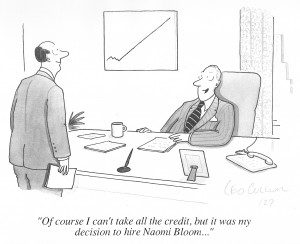Last month I posted the first installment of this series on planned changes in the mix and style of B&W consulting engagements/projects for 2011. It’s now with great pleasure that I announce one of those engagements. Beginning in January, I’ll be acting as a strategic advisor to the Human Capital Operations and Technology Solutions practice at Mercer, led by Kim Seals, who reports to Pat Milligan, the executive responsible on a global basis for all of Mercer’s Human Capital businesses.
A major focus of my work with Mercer will be their Human Capital Connect solution powered by Peopleclick Authoria technology, advising on business and marketing strategy through software architecture and functional roadmaps.
There were many factors that influenced my decision to take on Mercer and Human Capital Connect as a strategic advisory client, and none of them will surprise you:
-
Human Capital Connect (HCC) is based on the premise that proprietary, transformational consulting-based, best HRM practices packaged as intellectual property, if delivered through highly automated strategic HRM processes, would be a 1 + 1 = 3 proposition for everyone involved. I’ve written often enough about the importance of embedded intelligence to ensuring that self-service doesn’t produce any unintended side-effects but also that it does produce better decision-making at every level and, therefore, better business outcomes from our investments in HRM software. Although there are a number of similar efforts underway across our industry, Mercer’s commitment to embedded intelligence and the assets they’re bringing to Human Capital Connect are very persuasive. Quite frankly, without the type of embedded intelligence that I’ve advocated for so many years, and to which Mercer is committed with Human Capital Connect, even truly great HRM SaaS just sits there and stares at you. Removing knowledgeable and effective HR professionals (although this doesn’t apply by any means to all HR folks) and replacing them with automated HRM processes is a recipe for disaster if the best thinking and subject matter expertise of our best HR professionals isn’t captured and delivered to every user through the software. Without embedded intelligence, self service is really just data entry, and that’s not on my list of preferred HRM software behaviors.
- In addition to my commitment to embedded intelligence, which can be applied when automating any aspect of HRM, it’s really strategic HRM (called talent management in some circles) that makes a difference where it matters. Strategic HRM is all about improving revenues and profits, about business outcomes, rather than about achieving greater efficiency and effectiveness in the HR function. And that too is the focus of Mercer’s Human Capital business. So HCC isn’t just focused on reducing the administrative costs of various talent management processes but rather about using embedded intelligence and their own transformational consulting to drive those processes toward greater business outcomes — and with that objective I’m entirely simpatico.
- Mercer’s mix of human capital consulting clients, and therefore their prospect base for HCC, mirrors quite closely the types of large, complex, global organizations that have always been the focus of my direct end-user consulting. And while I no longer take on full-blown, large scope, transformational consulting projects with these same types of end-users (because such projects exceed the human resources of a solo practitioner), working with Mercer will enable me to keep my finger on the pulse of these types of firms, the HRM issues they are facing, and the ways in which HRM technology can enable the more effective delivery of strategic HRM. Although my strategic HRM delivery systems planning methodology can be used by organizations of all sizes and whether public or private sector, the challenges and, therefore, the opportunities and payoffs of the methodology loom much larger when applied to global, enterprise-scale clients.
- I’ve worked over the years with many, many HRM software vendors and outsourcing providers, often with competing vendors and providers, but the names of my clients (except for the very few that have insisted on perpetual anonymity) rarely appear “in print” except on my personal bio and in the relevant disclaimer notices. And when they appear on my personal bio, they’re listed in the aggregate under suitably vague headlines describing the type of engagement. But in choosing to work beginning again in 2011 with a few clients at a time, therefore becoming more engaged in not only specific projects but also in the outcome of these projects, I am applying that age-old yet VERY valuable guidance that you are judged by the company you keep. Not only does Mercer have a globally reputable brand, which they protect quite carefully in terms of the oversight of their workforce and work products, but I know well the people with whom I’ll be working directly, and their personal brands are also of the highest integrity.
I’m looking forward to working with Kim Seals and the Human Capital Operations and Technology Solutions team on an ongoing basis through 2011 and hope that I can make a positive contribution toward the results of their efforts.
Over the next month or two, I’ll be doing similar write-ups on the other clients/engagements that I’ve selected for 2011, highlighting what it is about a particular initiative or client that makes them a good fit for me. I’ll also be committing to new licenses in 2011 for my HRM domain model/architectural “starter kit” and related training — please note that all 2010 license slots have long been filled — and keeping my eyes open for 2012 clients/initiatives that will be a good fit for me. And you thought I was retiring? Didn’t you know that 70 is the new 40?
With many thanks to Leo Collum, the great business cartoonist, from whom I bought the above customized cartoon in the early days of Bloom & Wallace. Leo passed away in late October and is remembered here by The New Yorker.
